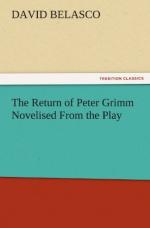The play was cut and cut until there was not a superfluous line in it. Every word was necessary, although it might not have seemed so when read. It was only after the play was recalled as a whole, that the necessity for everything could be seen. The coming of the circus with the clown singing “Uncle Rat has come to town,” and the noise of the drums, are instances of this. It seemed like halting the action to bring in a country circus procession, but its necessity is shown in the final scene when the little boy, William, passes away. It is always cruel to see a child die on the stage. The purpose of the coming of the circus was to provide a pleasant memory for the child to recall as his mind wandered away from earth, and to have his death a happy one. This was made more effective when Peter took up the refrain of the song as though he knew what was passing in the dying boy’s mind, showing that the dead have their own world and their own understanding.
No company of players ever had situations so fraught with danger of failure. They were very nervous. Mr. Warfield appeared in the part for several weeks before he felt at ease as the living man who returns as his own spirit.
There is one memory associated with the play which will remain in my heart as long as it beats. This piece was written during the last year-and-a-half of my daughter Augusta’s life. For some reason, which I could not understand then, but which was clear to me later, the subject fascinated her. She showed the greatest interest in it. The dear child was preparing to leave the world, but we did not know it. When the manuscript was finished, she kept it by her side, and, notwithstanding her illness, saw the dress rehearsal. During the writing of the play, she often said, “Yes, father, it is all true. I believe every word of it.” It was as though the thought embodied in the play gave her comfort. When we discovered how ill she was, I took her to Asheville, North Carolina, thinking the climate would help her. She grew worse. Still hoping, we went to Colorado, and there I lost her.
It has seemed to me since that the inspiration compelling me to go on with “Peter Grimm,” in spite of its difficulties, came from this daughter who died.
I cannot close this reminiscence of “The Return of Peter Grimm” without acknowledging the help and inspiration received from David Warfield, without whose genius and personality the play would not have been possible.
I doubt whether Mr. Belasco has ever infused so much imaginative ingenuity into the structure and picture of a play. Even in the reading, its quaint charm is instantly revealed. We quite agree with Winter in saying that the effectiveness of the role of_ PETER lies in its simplicity. This was the triumph of Warfield’s interpretation. It may have been difficult to attain the desired effects, but once reached, technical skill did the rest. It will be noted on the program that credit is given for an idea to Mr. Cecil DeMille, son of Mr. Belasco’s former collaborator. “The Return of Peter Grimm” was scheduled for production in London by Sir Herbert Tree, but plans were cut short by that actor’s sudden death, July 2, 1917.




